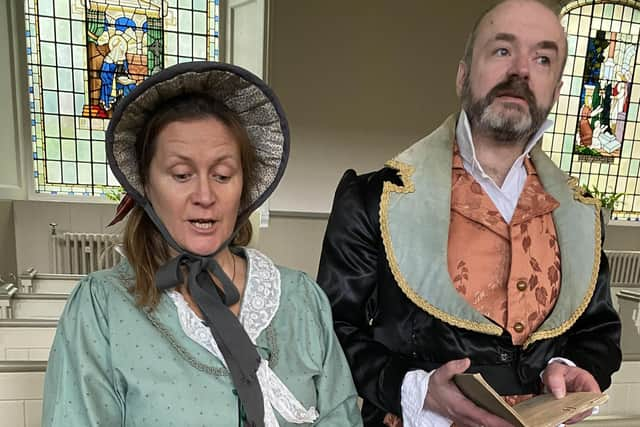Theatre Reviews: The Ghosts of North Leith | Learning to Fly
It’s a low season for theatre, just before this year’s pantomimes and Christmas shows explode onto the scene; but what better moment for a dark walk up Madeira Street to North Leith Parish Church, in the most elegant reaches of the old port, to commune with the spirits of Leithers past?
Director Liz Hare’s Citadel Theatre is one of Scotland’s best-known community theatre groups, dedicated to exploring Leith’s vivid past, and ever-changing present; and Ghosts Of North Leith is inspired by some of the graves in Coburg Street Burial Ground, a short walk from the church.
Advertisement
Hide AdAs the light dims, four gaunt faces loom from the balcony, warning us of the transience of our little lives; and then we launch into a series of six tales, all framed within the short life of Perthshire-born poet and campaigning journalist Robert Nicoll, hailed in the 1830s as “the next Robert Burns”, but dead of consumption at age 23.


It’s soon apparent, though, that death has done nothing to dim Robert’s radical spirit and investigative zeal; and in no time, in an adept and engaging performance by Fraser Allan Hogg, he is leading us through the ups and down of a ghost story from upwardly-mobile 19th century Trinity; the contrasting lives of 19th century minister David Johnston and his 17th century ancestor “Dainty Davie” Williamson, and the tale of one Robert Stoney, whose family had deep connections with the Jamaica slave trade.
After the interval, it’s anti-slavery campaigner Nelly Gladstone (a feisty Deborah Whyte), and her fraught relationship with her husband’s wealthy slave-trading family; then a lament for the tiny victims of the 19th century’s terrible infant mortality rates, and finally a jolly romp through the 1745 Jacobite Rebellion with Lady Anne Mackintosh, a fervent Jacobite commander.
Put together by a team of seven writers, Ghosts Of North Leith might be a slightly stronger show if it focussed more tightly on the 19th century stories of ill-gotten wealth and painful poverty at its heart, and forgot the jokey excursions into earlier history. Overall, though, it offers an outstanding piece of community drama, performed with real flair by a five-strong company that also includes Mark Kydd, Chelsea Grace and Grant McIver; and yet another reminder of the tremendous history of a port town irrevocably linked to the wider world through the intense trading history marked out in the very names of its streets, squares, and burial places.
At the Traverse, meanwhile, super-engaging solo performer James Rowland brings his 2022 Fringe show Learning To Fly back to Edinburgh for a brief visit. In this show, Rowland has a great and moving story to tell, about the relationship between a young version of himself – an unhappy schoolboy plagued by unspecified illness – who struck up a remarkable friendship with the eccentric old lady in the big house at the end of his suburban Manchester street.
Like many solo theatre-makers at the moment, he fairly messes up the rhythm of his tale with jokey meta-theatrical episodes which are essentially all about him; and it’s an open question whether the apparent audience popularity of these interruptions runs as deep as some performers imagine.
Advertisement
Hide AdWhat is undeniable, though, is the power of the central narrative, and the sheer storytelling talent that Rowland brings to it, both in the writing, which can soar to real lyrical heights, and in his performance, which can suddenly dive towards a wonderful meditative stillness and seriousness. More of that, please, when Rowland returns to the 2024 Fringe, with another brand new show.